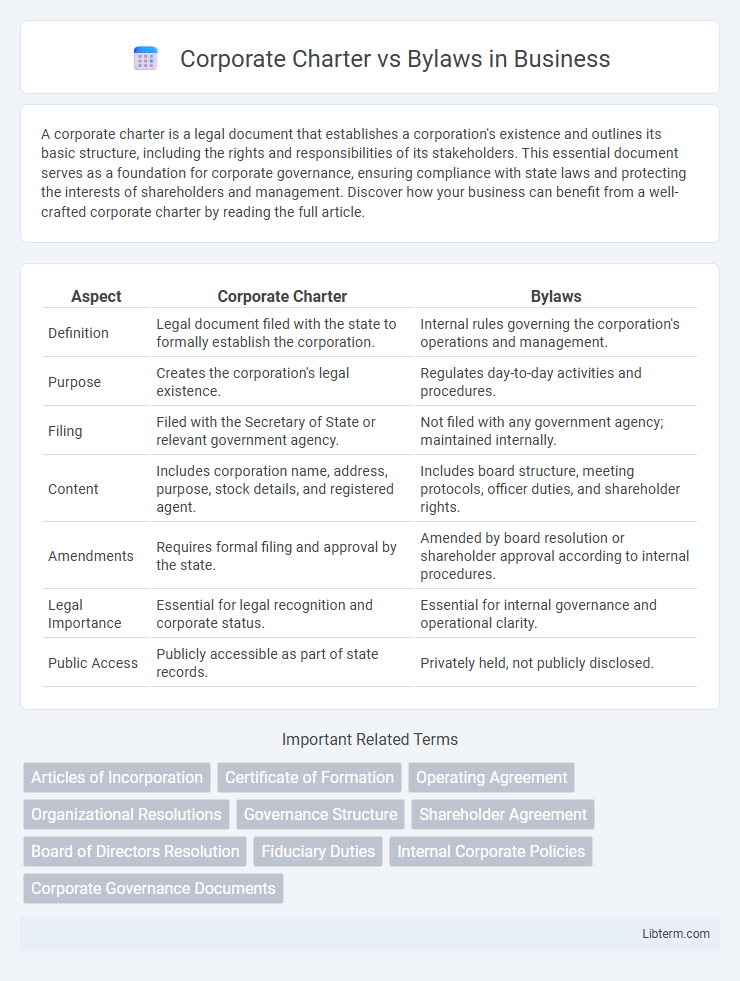A corporate charter is a legal document that establishes a corporation's existence and outlines its basic structure, including the rights and responsibilities of its stakeholders. This essential document serves as a foundation for corporate governance, ensuring compliance with state laws and protecting the interests of shareholders and management. Discover how your business can benefit from a well-crafted corporate charter by reading the full article.
Table of Comparison
| Aspect | Corporate Charter | Bylaws |
|---|---|---|
| Definition | Legal document filed with the state to formally establish the corporation. | Internal rules governing the corporation's operations and management. |
| Purpose | Creates the corporation's legal existence. | Regulates day-to-day activities and procedures. |
| Filing | Filed with the Secretary of State or relevant government agency. | Not filed with any government agency; maintained internally. |
| Content | Includes corporation name, address, purpose, stock details, and registered agent. | Includes board structure, meeting protocols, officer duties, and shareholder rights. |
| Amendments | Requires formal filing and approval by the state. | Amended by board resolution or shareholder approval according to internal procedures. |
| Legal Importance | Essential for legal recognition and corporate status. | Essential for internal governance and operational clarity. |
| Public Access | Publicly accessible as part of state records. | Privately held, not publicly disclosed. |
Introduction to Corporate Charter and Bylaws
A Corporate Charter, also known as Articles of Incorporation, is a legal document filed with the state to officially establish a corporation, outlining its basic information such as name, purpose, and stock details. Bylaws are internal rules adopted by the corporation's board of directors that govern management, procedures, and operational protocols. Together, the Corporate Charter provides the foundation of corporate existence, while the Bylaws set the guidelines for daily governance and decision-making processes.
Definition of Corporate Charter
A Corporate Charter, also known as Articles of Incorporation, is a legal document filed with the state government to officially establish a corporation. It defines the corporation's basic information such as name, purpose, duration, and stock details, granting the company its legal existence. Unlike Bylaws, which set internal rules for governance, the Corporate Charter serves as the foundational document authorized by the state.
Definition of Bylaws
Bylaws are internal rules established by a corporation's board of directors to govern the organization's management and operations. They define procedures for electing directors, holding meetings, and managing corporate affairs, ensuring consistency and compliance with legal requirements. Unlike the corporate charter, which is filed with the state and serves as the corporation's foundational document, bylaws are not filed publicly but are crucial for internal governance.
Key Differences Between Corporate Charter and Bylaws
A corporate charter, also known as articles of incorporation, is a legal document filed with the state to officially establish a corporation and outlines its fundamental details such as name, purpose, and stock structure. Bylaws are internal rules adopted by the corporation's board of directors to govern day-to-day operations, including procedures for meetings, roles of officers, and shareholder rights. The key difference lies in the charter's role as a public document for legal recognition versus bylaws serving as private guidelines ensuring organizational governance and compliance.
Purpose and Importance of a Corporate Charter
A Corporate Charter serves as the foundational legal document establishing a corporation's existence and outlining its fundamental purpose, powers, and structure as recognized by the state. It grants the corporation its legal status, enabling it to enter contracts, sue or be sued, and issue stock, which is essential for regulatory compliance and investor confidence. Unlike Bylaws, which govern internal management procedures, the Corporate Charter provides the authoritative framework necessary for corporate legitimacy and operational authority.
Purpose and Importance of Bylaws
Bylaws serve as the internal governance framework for a corporation, detailing rules for managing operations, conducting meetings, and defining roles of directors and officers, which the corporate charter typically does not specify. While the corporate charter establishes the corporation's existence and fundamental structure, bylaws provide essential guidelines ensuring consistent decision-making and organizational order. Well-drafted bylaws help prevent conflicts, facilitate compliance with state laws, and support effective corporate governance critical for sustaining business integrity and stakeholder trust.
Legal Requirements for Drafting Charters and Bylaws
Corporate charters must comply with state-specific legal requirements, including clear identification of the corporation's name, purpose, authorized shares, and registered agent information. Bylaws require detailed governance provisions, such as board structure, officer roles, meeting protocols, and shareholder rights, aligning with statutory regulations. Both documents must adhere to the jurisdiction's corporate laws to ensure validity and enforceability in corporate operations.
Amending the Corporate Charter vs Bylaws
Amending the corporate charter involves a formal process that requires shareholder approval and often state regulatory consent, ensuring changes align with legal and governance standards. In contrast, bylaws can typically be amended by the board of directors without needing shareholder involvement, allowing for more flexible internal management adjustments. Understanding the distinction in amendment procedures is crucial for maintaining compliance and effective corporate governance.
Impact on Corporate Governance
A Corporate Charter establishes a company's legal existence and defines its fundamental governance structure, serving as a primary document filed with the state. Bylaws provide detailed rules and procedures for internal management, including the roles of directors, officers, and shareholders. The interaction between the Corporate Charter and Bylaws directly impacts corporate governance by delineating authority, decision-making processes, and accountability mechanisms within the organization.
Choosing the Right Framework for Your Business
Selecting the right framework for your business involves understanding the distinct roles of Corporate Charters and Bylaws. A Corporate Charter, also known as Articles of Incorporation, legally establishes the company and outlines its primary structure and purpose, while Bylaws provide detailed governance rules and operational procedures. Prioritizing clarity in defining shareholder rights and management responsibilities within the Bylaws ensures smoother decision-making and regulatory compliance.
Corporate Charter Infographic

 libterm.com
libterm.com